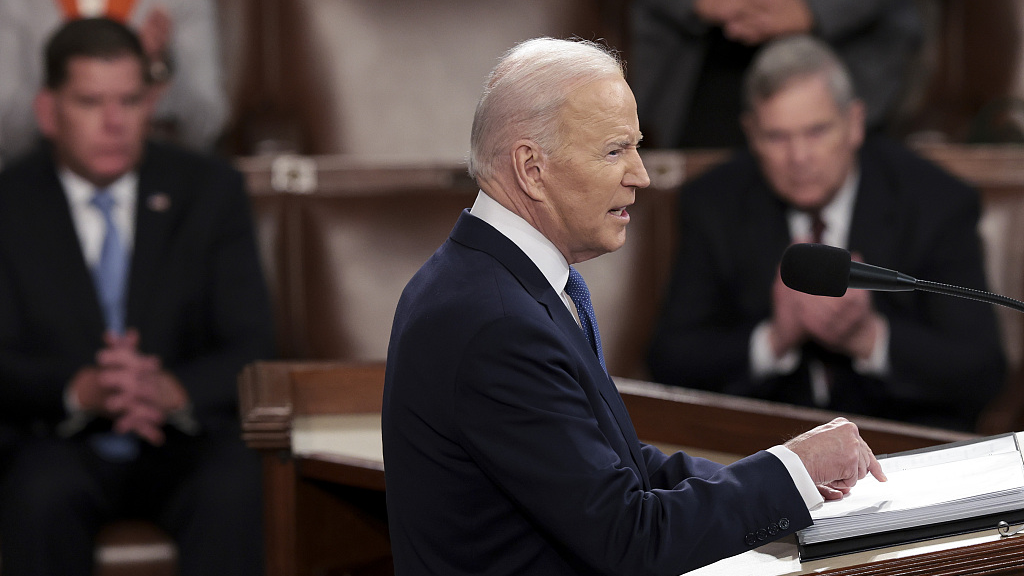
U.S. President Joe Biden delivers the State of the Union address during a joint session of Congress in the U.S. Capitol's House Chamber in Washington, D.C., March 1, 2022. /VCG
U.S. President Joe Biden delivers the State of the Union address during a joint session of Congress in the U.S. Capitol's House Chamber in Washington, D.C., March 1, 2022. /VCG
Editor's note: Anthony Moretti is an associate professor at the Department of Communication and Organizational Leadership at Robert Morris University. The article reflects the author's opinions and not necessarily those of CGTN.
U.S. President Joe Biden delivered the State of the Union address on the night of March 1 (local time). His speech came at a time when the state of America remains in distress, and there are legitimate questions about whether he can rally the country to see an optimistic future.
Consider it was almost two years ago that the U.S. experienced its first wave of the pandemic. Instead of coming together, Americans were divided. The cracks that were already apparent throughout U.S. society blew wide open, and two camps quickly solidified. One group believed each person had to sacrifice, even if just a little bit, for the good of everyone else, and a second group insisted coronavirus was either a hoax or no big deal. It did not help that Donald Trump, the man who occupied the White House at the time, seemed to care little for the health of Americans far and wide.
Trump also had zero concern for the Asian community, which was subjected to one hate attack after another as the pandemic spread. In fact, enabled by Trump's anti-China and anti-Asian rhetoric, more and more Americans began to think they were making the country safer as they preyed on the fears of Asians all across the land.
Roughly 10 months after the pandemic reached America's shores, the Capitol was under siege. On that cold day, hundreds of people, claiming they were real Americans as they attempted to destroy the republic, stormed the Capitol in an effort to prevent Congress from affirming that Biden had won the presidential election. Politicians from both parties united – for about a day – in criticizing the protesters who ought to be called treasonists. But soon Republicans began to argue that what the globe witnessed on January 6, 2021, was merely a group of people who were just a little bit out of control.
Biden became president insisting America would return to the bucolic days that came with being a supposedly good citizen on the global stage. However, just a few short weeks after Biden was inaugurated, his secretary of state publicly embarrassed himself as he openly criticized his Chinese counterparts. Secretary of State Antony Blinken wanted the Chinese to know that America and its allies thought China was evil because it refused to play by the Western-created world order. Unfortunately for Blinken, his rant had echoes of the weak-minded people who had surrounded Trump and who quickly parroted every nonsensical idea Trump articulated. Justifiably, Blinken's rebuke was met by a reminder that U.S. history had provided a plethora of examples to validate that no U.S. official should ever lecture an official from any other country about human rights.
As 2021 wound down, Americans were optimistic that perhaps the worst of pandemic life was over. But with roughly half the country still in denial about the dangers of coronavirus and its variants, no one really should have been surprised when omicron ravaged the country and again put the medical community in desperation mode. The two aforementioned camps remained steadfast, stubbornly insisting the other side was responsible for the disastrous health conditions.

City workers gather to protest against COVID-19 vaccine mandates and restrictions in New York City, February 7, 2022. /VCG
City workers gather to protest against COVID-19 vaccine mandates and restrictions in New York City, February 7, 2022. /VCG
At about the same time, Americans began realizing their money was being stretched to breaking point. Inflation was soon to reach levels not seen in four decades, but neither the Democrats nor the Republicans seemed all that interested in doing something about it. Instead, both parties sharpened their knives in anticipation of what will be a divisive 2022 midterm election cycle.
Finally, just days before Biden's State of the Union address, two more events provided even more ammunition to those people who see America in shambles. First, the president appeared to be on the sidelines as European leaders, especially French President Emmanuel Macron, reacted strongly to the initial days of the war in Ukraine. Yes, Biden announced one wave of sanctions after another against Russian officials and their country, but he seemed to lack a message that went beyond sanctions, sanctions and more sanctions.
And then Americans learned that baseball – so-called "America's pastime" – would not start on time as the sport's owners and players could not agree on a new labor agreement.
Those failed conversations between the billionaires who own baseball teams and the millionaires who play on them really do explain where America is at the moment. Two camps talked a lot. And occasionally yell at each other. And all the while, little gets accomplished as despair quickly suffocates optimism.
Biden built his professional career in part on a folksy, next-door neighbor-like quality. Nevertheless, that persona can come with a price: When the president demands that either politician get his or her act together or that the American people sacrifice for the good of the nation, it is easy to ignore him.
That is happening right now. And so as Americans begin to think about spring, their country seems stuck in a cold, dark winter.
(If you want to contribute and have specific expertise, contact us at opinions@cgtn.com.)

